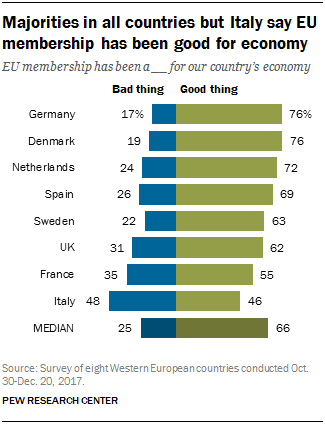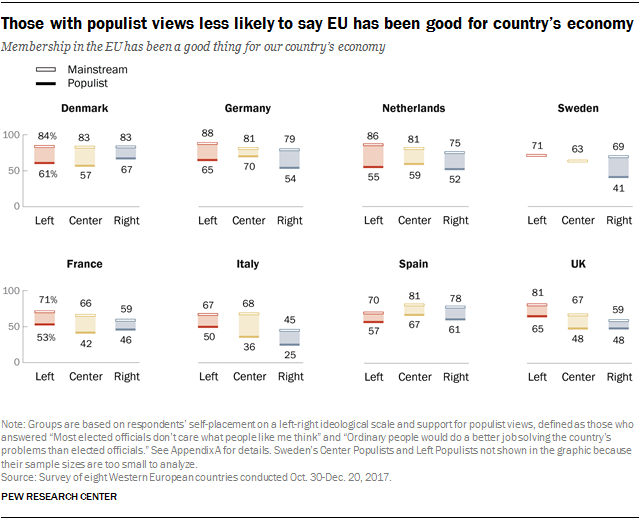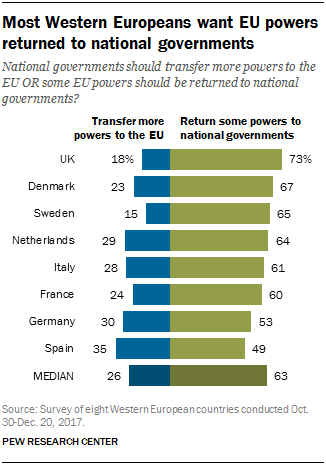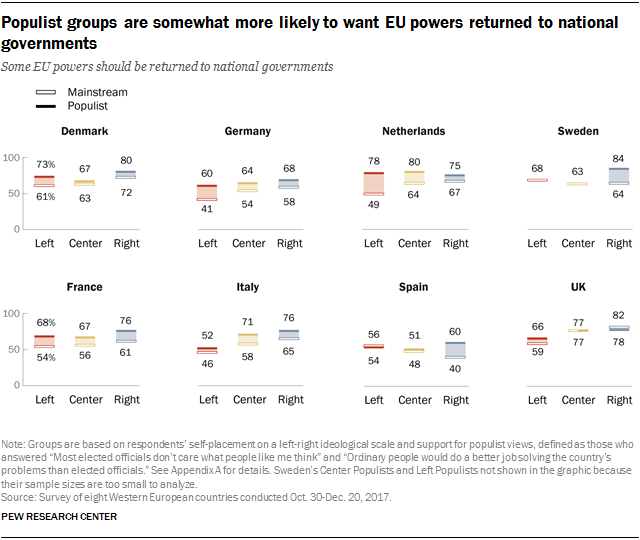A majority of Western Europeans in the eight countries surveyed say membership in the European Union has been a good thing for their nation’s economy. Despite these views, majorities say some EU powers should be returned to national governments.
Those on the left tend to be relatively more pro-EU than those on the right.9 People with populist views have less positive attitudes about the institution’s economic benefits, and more of a desire for some EU powers to be returned.
Most Western Europeans say EU membership has economic benefits
 Majorities in every country but Italy say EU membership has benefited their country economically. This sentiment is most widespread in Denmark, Germany, the Netherlands and Spain, where about seven-in-ten or more see EU membership as a good thing.
Majorities in every country but Italy say EU membership has benefited their country economically. This sentiment is most widespread in Denmark, Germany, the Netherlands and Spain, where about seven-in-ten or more see EU membership as a good thing.
Italians are split on how EU membership has affected their country: 46% say membership has been good for the economy, while 48% say it has been bad. And nearly one-third (32%) say they strongly feel EU membership has harmed the Italian economy.
In every country surveyed, people who hold populist views are less likely than those in the mainstream to say EU membership has positively impacted their nation’s economy. In half of the countries, Left Populists and Right Populists feel similarly about the institution – despite significant differences among their countries’ Left and Right Mainstream. For example, in the Netherlands, just 52% of Right Populists say the EU has been good for their economy, as do 55% of Left Populists and 59% of Center Populists. Among the mainstream in the Netherlands, much larger majorities see EU membership as an economic positive: 86% of the Left Mainstream, 81% of the Center Mainstream and 75% of the Right Mainstream say EU membership has benefited their national economy.
In most countries – France, Italy, the UK, the Netherlands and Germany – people on the left are more likely than those on the right to see EU membership as a good thing for the economy. For example, in Italy and the UK, Left Mainstream respondents are 22 percentage points more likely than the Right Mainstream to say EU membership has helped their economy. In Spain, however, the left-right pattern is reversed: For example, the Right Mainstream group (78%) is somewhat more likely than the Left Mainstream (70%) to see EU membership as an economic positive.

Most want some EU powers returned to national governments
 Despite widespread belief in most countries that the EU has benefited national economies, roughly half or more in all countries surveyed say they want some EU powers returned to national governments. Even in Denmark and the Netherlands – countries where broad majorities see economic benefits from the institution – roughly two-thirds say some EU powers should be returned.
Despite widespread belief in most countries that the EU has benefited national economies, roughly half or more in all countries surveyed say they want some EU powers returned to national governments. Even in Denmark and the Netherlands – countries where broad majorities see economic benefits from the institution – roughly two-thirds say some EU powers should be returned.
The desire for returning EU powers to individual countries is most widespread in the UK, where the national government is currently negotiating an exit from the EU. Nearly three-quarters of Brits (73%) say they want to see some powers returned. Germans and Spaniards are the least likely to favor this type of change (53% and 49%, respectively).
People who hold populist views are more likely than those in the mainstream to want more national sovereignty in seven of the eight countries surveyed. For example, in France, 68% of Left Populists support EU powers being returned to national governments, compared with 54% of the Left Mainstream; on the right, 76% of Right Populists say the same, versus 61% of the Right Mainstream. The one exception to this pattern is the UK, where populists and mainstream respondents largely agree on this issue.
Ideology also plays a role in how people view the division of powers between the EU and national governments. Across five of the eight countries, those on the ideological right are significantly more likely than those on the left to think that powers should be returned to national governments. For example, British Right Mainstream respondents (82%) are more likely than the Left Mainstream (59%) to want powers returned to their national government.
The three countries where those on the right are not more likely than those on the left to support the return of powers to national governments are France, Spain and Sweden. In France and Sweden, those on both sides of the ideological spectrum largely agree on the issue, while in Spain, the left is more likely than the right to want powers returned. For example, Spain’s Left Mainstream (56%) are more likely than those in the Right Mainstream (40%) to think some EU powers should be returned.



 Explore traditional and populist party support in Western European countries
Explore traditional and populist party support in Western European countries Country-specific data on news media and political attitudes
Country-specific data on news media and political attitudes